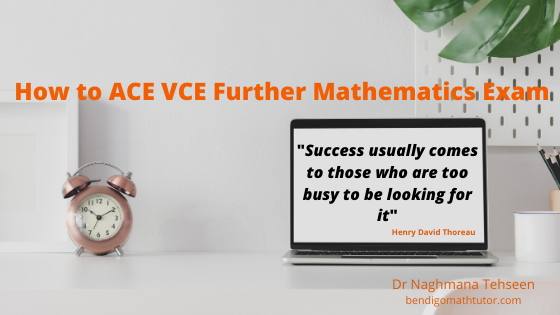The final days of high school and exams are approaching quickly. Now is the time to start your revision and put strategies in place to ACE your final further mathematics exam. Here are a few important tips to help you to get the best possible study score.
Summary Book:
If you have not prepared your summary book yet, do that straight away. Your summary book is very important, and it is going to make a huge difference in your final exams. It doesn’t need to look like a textbook – you don’t want to waste your time flicking through to find what you need. Keep it short and use dividers to highlight the topics so you can find relevant content quickly. The examiner report (which can be found on the VCAA Website) is definitely worth a read. These reports show you which problems students struggled with in previous years. This will help you plan your revision carefully. Remember to add examples of difficult worded questions into your summary book – these will come in handy as you are likely to get similar questions ( as examiners tend to include similar problems).
CAS Calculator:
Further Mathematics students are allowed to use a CAS calculator in all assessments so you need to know your calculator inside out! I would say that your calculator is going to be your best friend and a great time saver. Find out how to use any shortcuts and tips available. You should know every bit of your CAS Calculator.
Practice Past Exams:
The best way to get good marks in the final exams is to practice past papers. Practice, correct practice, and time-constrained correct practice are the steps that lead to good exam preparation. Practice a couple of exam papers with a focus on correctness without any time constraints because you need to familiarise yourself with the exam style and questions, plus time pressure can limit your ability to problems solving. Once you are confident at solving problems without a time limit, then you can introduce a time constraint. I would recommend doing at least five years’ worth of exams. I know it sounds like a lot, but I can guarantee you it is doable, and its return is worth a go.
Answer Questions Correctly:
Read the question carefully and think about what you are asked. It is very easy to make little mistakes like decimal places or units when a question specifies them. Re-read your question and put it in your own words so the marker can see how you have interpreted it. Remember to show your working for each question, your working out is where you get marks from not just the final answer. It is possible to get some marks of knowing the concept or theory behind it even if you don’t get the expected answer. Try to answer every question even if you are not sure you are doing it correctly. It will give you a chance to pick up some extra marks. Remember to check your answer (you may substitute values back in, check if the question asked for a level of accuracy or specific format, and even just think “does this look right”?). We all make silly mistakes, especially under exam pressure, but by checking your answer and reviewing your work you may be able to pick up some silly errors and score yourself a few extra marks.

If you found this blog helpful, please feel free to share it (“Sharing is caring”).
If you are interested to know about the VCE maths method, make sure you read this blog post: How to tackle VCE Maths methods
My name is Dr. Naghmana Tehseen and I am an online maths tutor. I have extensive teaching experience. As a maths specialist, I am making it my life mission to make sure every child has an opportunity to explore the beauty of mathematics. I am accepting new students, check out my website at www.bendigomathtutor.com. If you have any questions, you can always contact me on my website or at bendigomathtutor@gmail.com


LEAVE A COMMENT